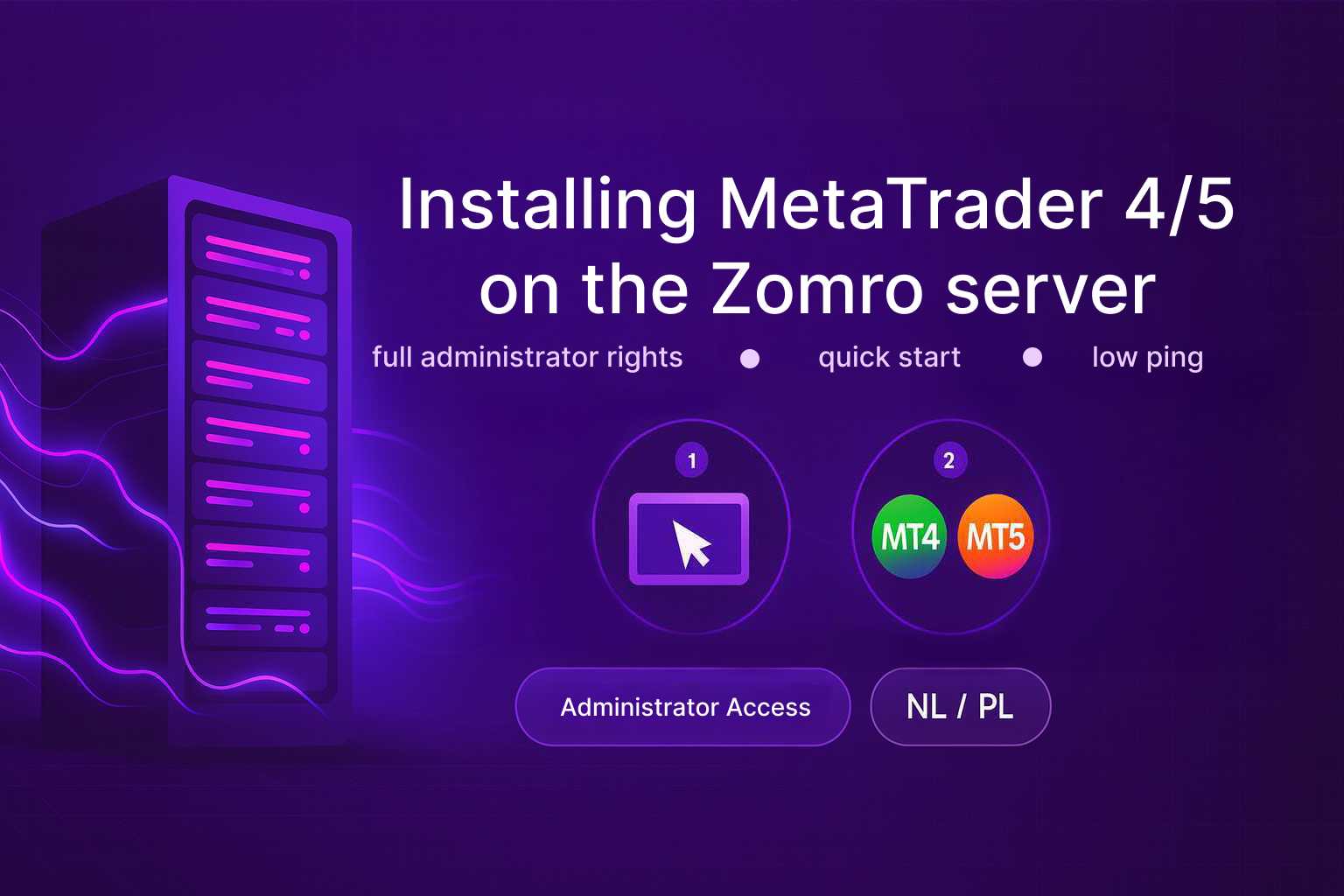
Updated version of the article “How to install your MT terminal…” on a server with administrator access (Forex VPS from Zomro). Full RDP admin access is available, and you can install any software.
For whom this instruction is intended
-
Traders and quant developers who run MT4/MT5 (as well as cTrader and auxiliary utilities) on a Forex VPS from Zomro.
Users migrating from providers with limited access rights (legacy Forex VPS) who want to configure the terminal “just like on their PC,” but with server-grade reliability.
Connecting to the server (RDP)
On your local PC, open “Remote Desktop Connection” (mstsc), enter the Zomro VPS IP and the Administrator login.
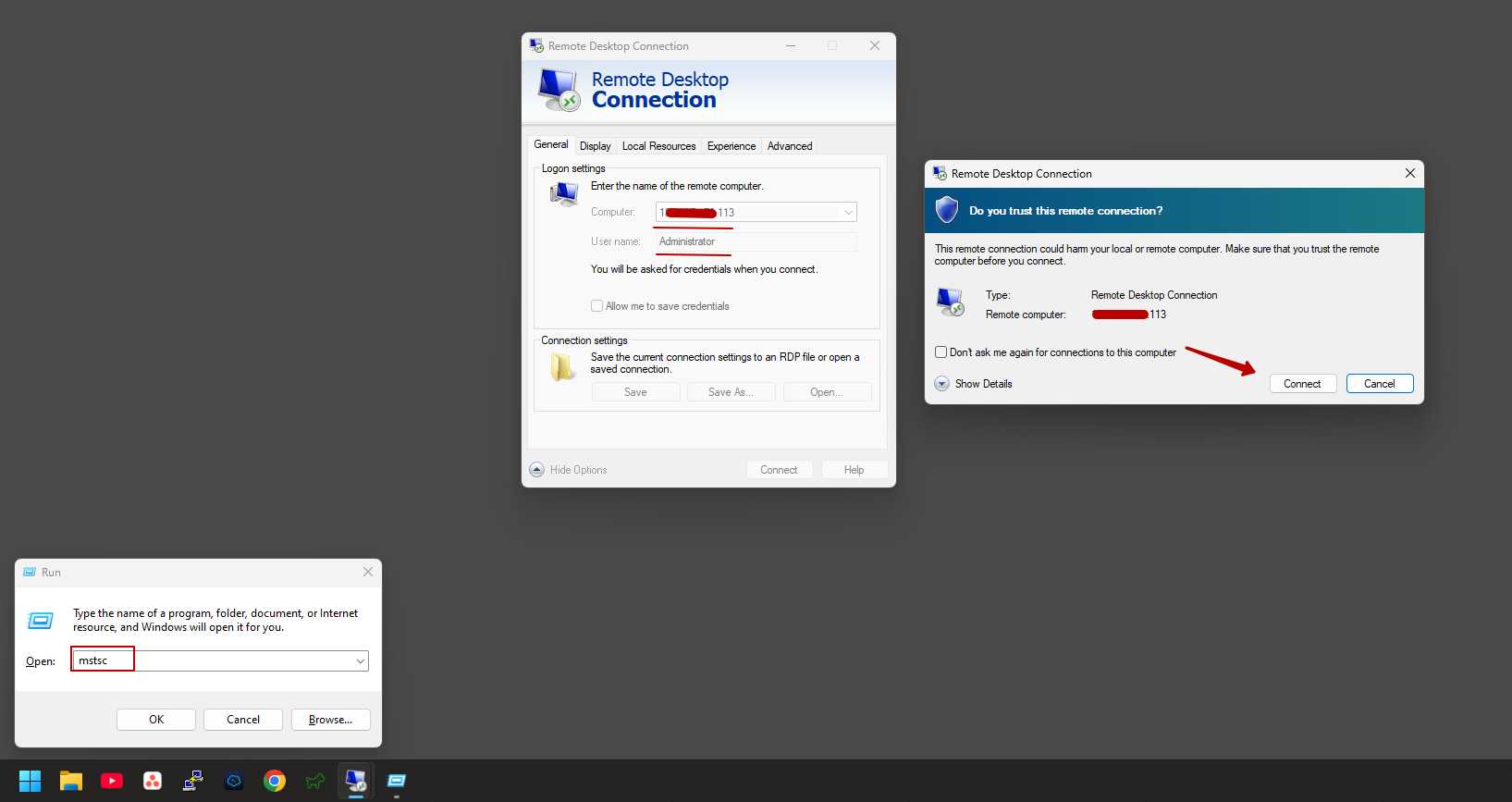
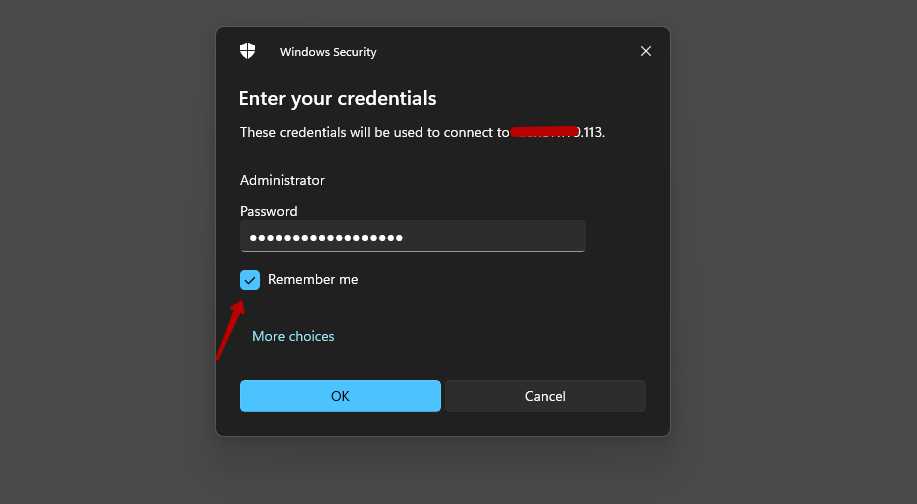
-
Recommended RDP settings:
- Local resources: printers/clipboard — optional.
- Experience: disable “Window animation” and “Visual styles” if performance is a priority.
Initial setup of Windows Server
Power
- Control Panel → Power Options → High Performance
- Sleep and hibernation — disable. Display — “Never”
Time and Time Zone
- Check the time zone and enable automatic time synchronization (w32time). Accuracy is critical for scalping/arbitrage.
Windows Updates
- Install updates, then switch to manual maintenance window mode (scheduled outside trading hours).
- Disable automatic restarts during trading time (Group Policy → “Do not automatically restart…”).
Components and Libraries
- Microsoft Visual C++ Redistributable (x86 and x64, 2010–2022)
- .NET Framework (for utilities/panels)
- WebView2 (relevant for parts of the MT5 interface and third-party panels)
Installing a browser and downloading MT4/MT5
-
Install your preferred browser (Chrome/Firefox/Edge).
Go to your broker’s website (the broker’s distribution is recommended — it already includes server addresses and symbols).
Download the MT4 or MT5 installer.
Run the installation as administrator.
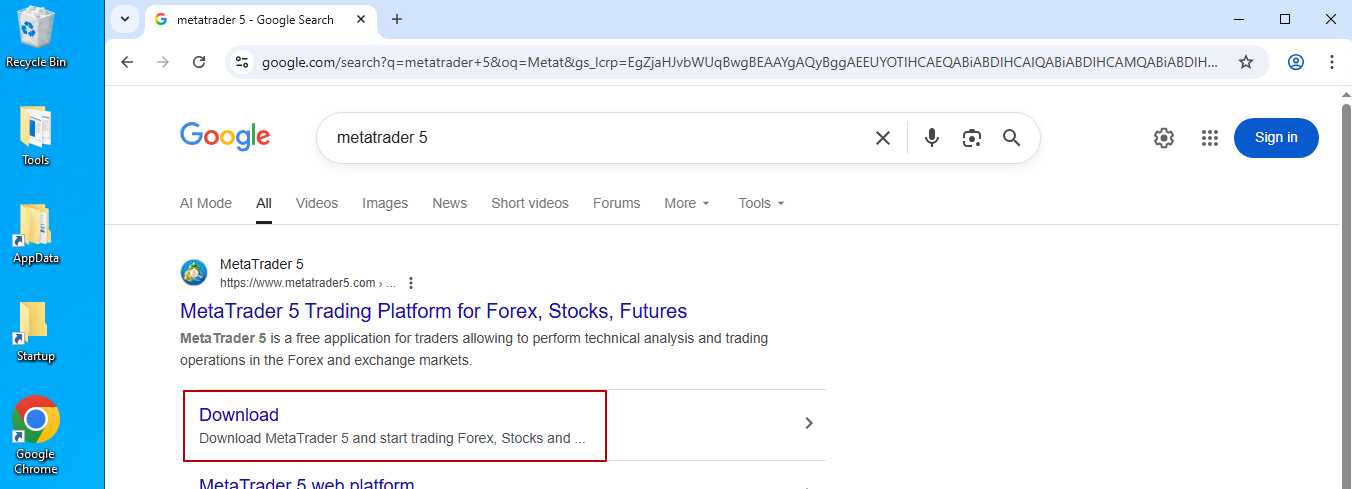
Alternative: download the “clean” MT4/MT5 (MetaQuotes) and manually add your broker’s trading servers during the first launch
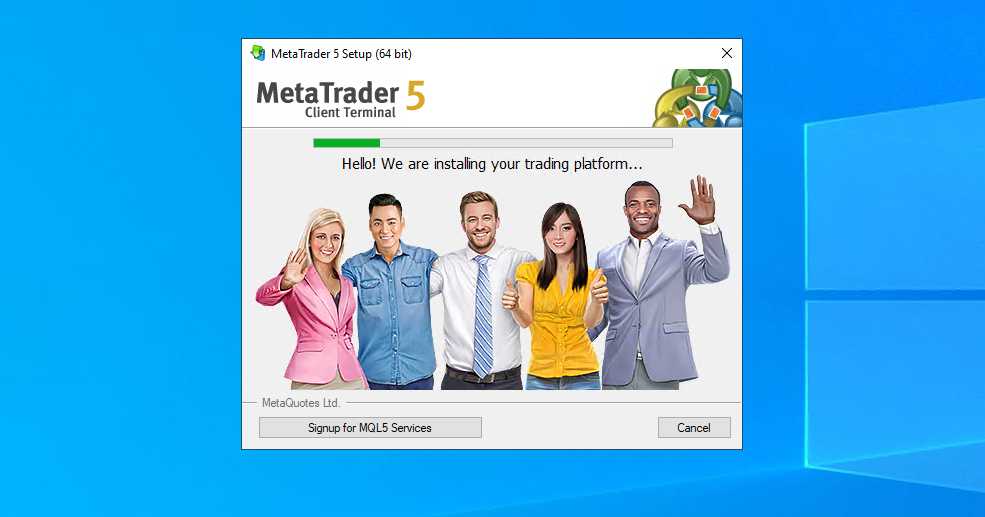
Installation mode: “for all users” or portable
Option A — standard installation (recommended)
- Installer → “For all users” (if available) → default path
- This simplifies maintenance and auto-start
Option B — portable mode
- Install the terminal into a folder, e.g.:
D:\Trading\MT5_BrokerX - Create a shortcut to
terminal.exe /portable(data is stored next to the exe) - Pros: full control, clean transfers, cleanup/backup with a single folder
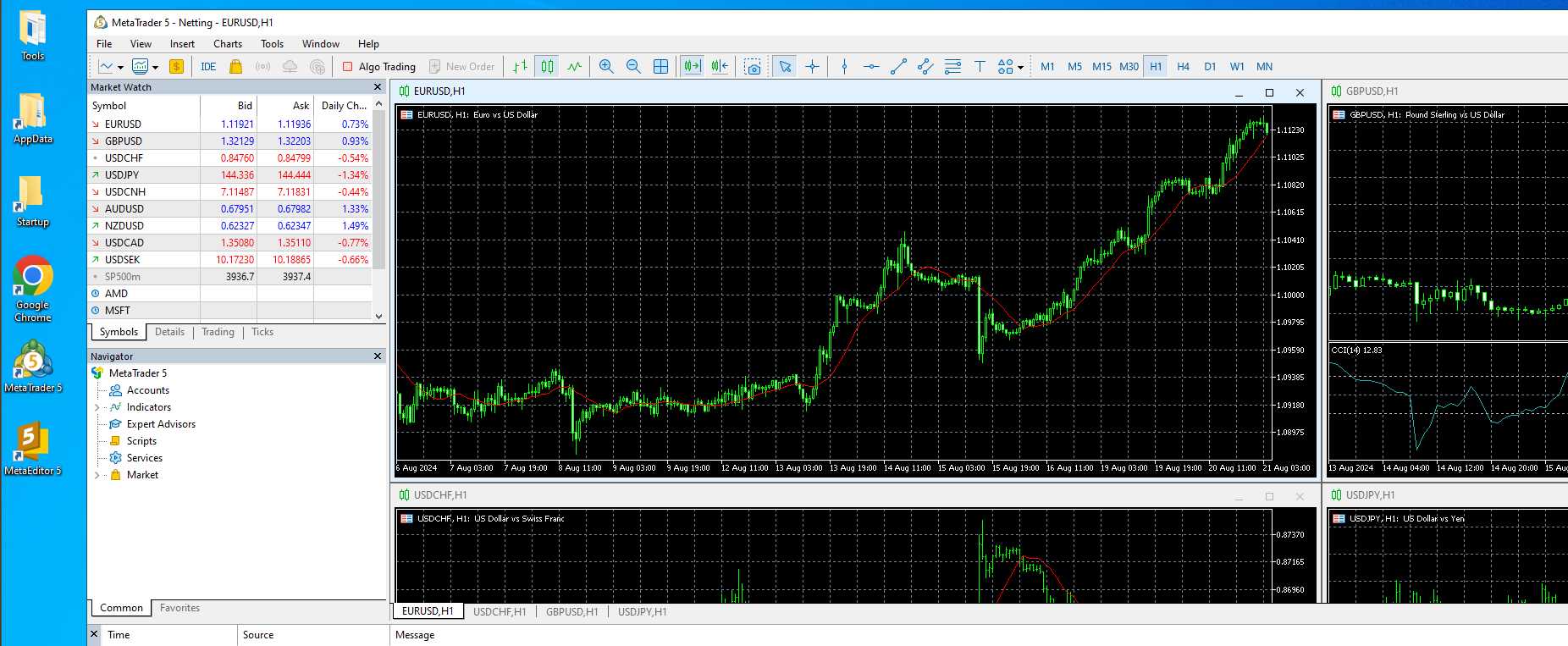
Data folder and user files
Open the terminal → File → Open Data Folder. It’s important to transfer/create:
MQL4/MQL5→Experts,Indicators,Libraries,Include(your bots, indicators, DLLs)templates(*.tpl),profiles(window layouts),config(settings),tester(tester’s working folder),history
If migrating from an old VPS — copy the corresponding folders. Close the terminal during the transfer.
Default paths:
C:\Users\Administrator\AppData\Roaming\MetaQuotes\Terminal\<HEX_ID> или для portable: D:\Trading\MT5_BrokerX\MQL5 и т.д.
Первая авторизация и базовые проверки
-
Open the terminal, enter your account login/password, and select your broker’s server.
Check:
- Journal — any network/authentication errors
- Navigator — whether experts/indicators are visible and MQ4/MQ5 compile correctly
- Templates and profiles — everything restored as in your working environment
- Server ping — the lower, the better execution
Autostart and fault tolerance
Task Scheduler
- Create a task “At logon” or “At system startup,” action — launch
terminal.exe(or multiple instances with different data folders) - Options: “Run with highest privileges,” “Repeat on failure every 1 min”
Alternative: NSSM / Windows Service
- With NSSM (Non-Sucking Service Manager), you can run the terminal as a Windows service.
- Suitable for advanced users — allows background operation, auto-restart, and no dependency on user login.
Monitoring
- Enable logging of trading events
- Use watch scripts to trigger restarts on specific events
- Set up external alerts (e-mail/Telegram) for errors or disconnections
Performance optimization
Do not overload your VPS: follow the recommended number of simultaneously running terminals according to your Forex VPS 1…4 plan (NL/PL).
RDP graphics: disable font smoothing/animation if not needed.
Disk:
logsandtesterfolders can grow quickly — clean up logs and tester periodically.
Security
RDP: enable NLA, use a strong password, optionally change the RDP port, and restrict access by IP (whitelists in the firewall).
Accounts: keep the admin account private, create a separate limited user for daily tasks.
Antivirus/Defender: add exclusions for MT4/MT5 working folders (only if risks are understood), regularly scan downloaded EAs/DLLs.
2FA: enable two-factor authentication in broker personal accounts.
Backup and recovery
Make regular backups of the data folder (or the entire portable folder).
3‑2‑1 scheme: 3 copies, 2 different media, 1 — off-server.
For quick backup, a ZIP archive is sufficient
MQL4/MQL5,templates,profiles,config.
FAQ
Can I run multiple terminals on one VPS?
- Yes, but follow your plan’s recommendations. If the number of robots/symbols grows, upgrade to a higher plan.
Is there a reason to install a “clean” MT5 instead of a broker version?
- Yes, if you work with multiple brokers and want a unified binary. But broker builds simplify server connection.
How to speed up quote/chart loading?
- Limit the number of open symbols/timeframes, clean history, use an NVMe disk — Zomro advantage.
Should I disable automatic Windows updates?
- No. Update outside trading hours on a schedule.
Summary
On a Zomro server with administrator rights, installing MT4/MT5 is just as straightforward as on a local PC: download the installer, install (or unpack the portable version), transfer user folders, configure autostart and security. Following the plan recommendations (Forex VPS 1…4 in NL/PL) and basic Windows settings ensures stable robot operation with minimal latency and no “surprises.”